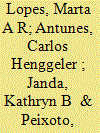|
|
|
Sort Order |
|
|
|
Items / Page
|
|
|
|
|
|
|
| Srl | Item |
| 1 |
ID:
128336


|
|
|
|
|
| Publication |
2014.
|
| Summary/Abstract |
Axon et al., (2012) argue that maximizing the potential for energy efficiency and demand reduction in tenanted commercial properties requires a "building communities" approach. This paper develops and extends Axon et al.'s proposed framework in two ways. First, by extending its applicability from tenanted to owner-occupied properties. Second, by situating it within the literature related to organizational culture, occupant behaviours, and technology adoption. The paper begins with a brief review of the existing research on people, energy and commercial buildings. This literature tends to address either organizational choices, or occupant behavior, but it rarely crosses the analytical boundaries between these two groups. The paper then explores these different levels of analysis within a 3Cs - "concern, capacity, and conditions" - framework, which was developed to describe and distinguish organizational responses to an energy crisis. The combination of the "building communities" and 3Cs frames reveals gaps and grey areas between organizational culture, occupant behaviour, and technology adoption where further conservation opportunities may lie. These understudied areas suggest that there may be "social potential" for change that is between and beyond the frames used by previous research in the field.
|
|
|
|
|
|
|
|
|
|
|
|
|
|
|
|
| 2 |
ID:
150802


|
|
|
|
|
| Summary/Abstract |
The transition to smart grids is an on-going process that may both shape and be shaped by end-users' energy behavioural adaptations. This study explores current and potential energy behavioural adaptations in Portugal during the smart grid transition process. A web-based survey was made to a representative sample of a specific segment of Portuguese residential end-users. The survey evaluated current energy behaviours and hypothetical future behaviours in a dynamic pricing scenario. Results show this population segment has a positive predisposition towards smart technologies and demand shifting, but it is less likely to accept load control and switch to the liberalised energy market. Factors influencing the behavioural potential are mostly related with market regulation, households' practices and usage behaviours, interference with the private domain, information and technical aspects, and social values. To facilitate behavioural adaptations several strategies are recommended, such as improving the energy market regulation, assessing households' behaviours, prioritising actions already embedded in households daily routines, not interfering with their activities and ensure an override option, and improving energy services, trust and information provided to end-users. The conclusions of the present study are of utmost importance for the design of more effective demand response programmes and energy policies.
|
|
|
|
|
|
|
|
|
|
|
|
|
|
|
|
|
|
|
|
|